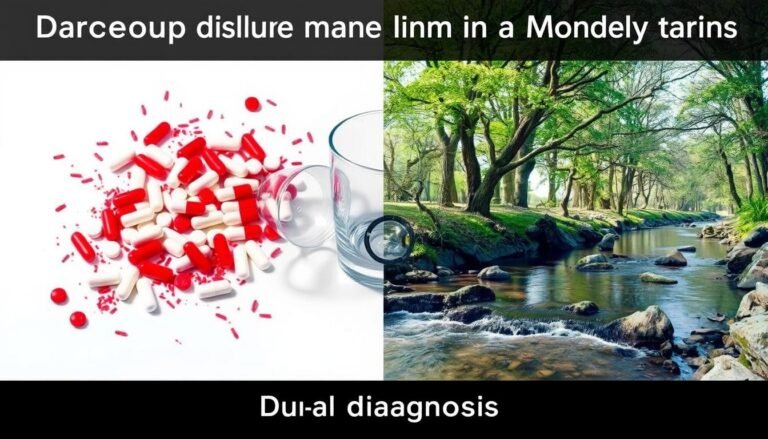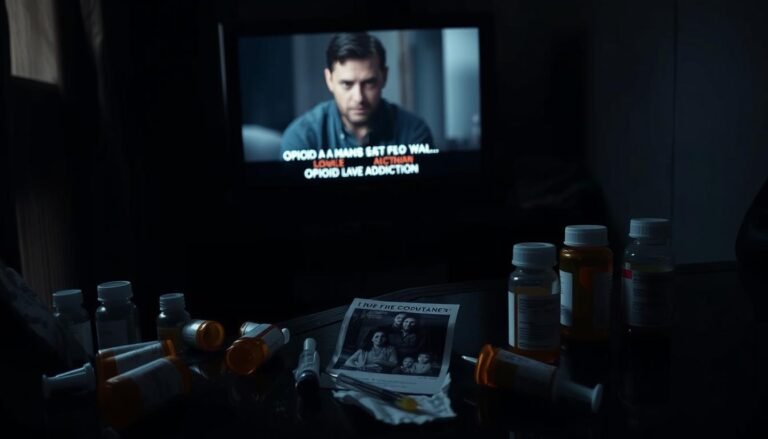Benefits of an Outpatient Drug Rehab Center – Get Help Now
Are you struggling with addiction and don’t want to stop your life for inpatient treatment? Outpatient drug rehab might be what you need. It lets you get help while keeping up with your daily life. But why is outpatient rehab so good? Let’s look at the benefits that could change your path to sobriety.
Key Takeaways
- Outpatient drug rehab offers a flexible and customizable treatment approach to support your recovery goals.
- You can receive intensive therapy while continuing to work, attend school, or care for your family.
Outpatient programs are often more affordable than inpatient treatment, with insurance coverage helping to minimize out-of-pocket costs.
- Access to medical professionals and evidence-based therapies can help you achieve long-term sobriety.
- Family involvement in your outpatient treatment can strengthen your support system and overall wellbeing.
Understanding Outpatient Drug Rehabilitation Programs
Outpatient drug rehab programs are flexible and easy to fit into your life. They let you get help for addiction without giving up your daily activities. You can keep up with work, family, and hobbies while you recover.
Types of Outpatient Treatment Options
There are different kinds of outpatient rehab programs. They vary in what they offer and how long you stay. Here are a few examples:
- Intensive Outpatient Programs (IOPs): You go 3-7 times a week, for 3 hours or more each time. These are for people with serious addiction problems.
- Standard Outpatient Therapy: You go 1-2 times a week, for up to a year or more. This is good for those with mild to moderate addiction.
Core Components of Treatment
Outpatient rehab programs usually include a few key things:
- Individual counseling: You meet with a therapist to talk about your addiction and find ways to cope.
- Group therapy: You join groups to share experiences and get support from others.
- Focus on trigger recognition and management: You learn to spot and handle things that might make you want to use drugs again.
Duration and Intensity Levels
How long and intense your rehab program is depends on you. Intensive programs need at least 9 hours of treatment a week. Standard programs might be 1-2 hours a week. Programs can last from a few weeks to over a year, based on how well you’re doing and how bad your addiction is.
Outpatient rehab programs are flexible and tailored to your needs. They let you keep up with your life while getting the help you need to overcome addiction.
Benefits of an Outpatient Drug Rehab Center
Outpatient drug rehab centers offer many benefits. They let you keep up with work and family while getting help. You don’t have to stay in a rehab center full-time like in inpatient programs.
Outpatient rehab is also cheaper than inpatient treatment. It can cost under $1,000, compared to inpatient rehab’s $2,000 to $40,000 a month. This makes it easier for more people to get help.
Outpatient rehab lets you use what you learn in real life. This helps you keep up good habits and deal with tough situations better. It’s a great way to practice what you’ve learned.
| Treatment Option | Average Cost | Key Advantages |
|---|---|---|
| Inpatient Rehab | $2,000 – $40,000 per month |
|
| Outpatient Rehab | Under $1,000 total |
|
Outpatient rehab also keeps you close to your loved ones. Having friends and family support is key to staying sober. It helps a lot in your recovery journey.
The advantages of outpatient rehab are clear. It’s flexible, affordable, and lets you practice what you learn. These reasons make outpatient drug rehab a great choice for many people.
Flexibility to Maintain Work and Family Life
Outpatient drug rehab centers offer a flexible solution for those seeking addiction treatment. They allow you to keep up with work and family duties. Unlike inpatient programs, outpatient rehab doesn’t require a full-time commitment.
Balancing Treatment with Daily Responsibilities
Outpatient rehab programs run in the evenings or off-hours. This lets you go to therapy without messing up your work schedule. It’s great for people in stressful jobs who can’t take a lot of time off.
By fitting outpatient care into your daily life, you can keep working and caring for your family. This way, you can focus on getting better without giving up your responsibilities.
FMLA Protection and Employment Rights
The Family and Medical Leave Act (FMLA) protects your job while you get treatment. Even though you don’t get paid, it ensures your job is safe. This is important for your health and well-being.
Programs like Greenbranch Recovery help you create a treatment plan that fits your life. They support you while respecting your work and personal life.
“Outpatient rehab enables professionals to attend therapy sessions in the mornings, evenings, or weekends, without requiring extended leave from work.”
Cost-Effective Treatment Solutions
Many people looking for addiction treatment worry about the cost. Luckily, outpatient drug rehab is often more affordable than inpatient programs. This makes it easier for those with limited insurance coverage or who have to pay out-of-pocket.
Outpatient programs cost less because they don’t require you to stay overnight. The price for an outpatient rehab can be between $5,000 and $10,000 a month. This is cheaper than the $20,000 to $60,000 for inpatient care. Plus, many insurance providers cover a lot of the costs for outpatient addiction services.
| Treatment Type | Average Cost per Month | Insurance Coverage |
|---|---|---|
| Outpatient Rehab | $5,000 – $10,000 | Often Extensive |
| Inpatient Rehab | $20,000 – $60,000 | Can Vary Significantly |
Outpatient rehab is not only affordable but also flexible. It lets you keep up with your daily life while getting help. With evidence-based therapies and care tailored to you, outpatient programs offer quality treatment without the long stay of inpatient care.
“Outpatient rehab allowed me to get the support I needed while I could work and take care of my family. The cost was much more manageable, and my insurance covered a big part of the treatment.”
Professional Medical Supervision and Support
Outpatient drug rehab centers offer full medical support during recovery. They have a team of addiction medicine experts. These experts give personalized care that fits each patient’s needs.
Medication-Assisted Treatment Options
Many outpatient programs use medication-assisted treatment (MAT). Doctors give medicines like buprenorphine or naltrexone to help with withdrawal and cravings. They also watch patients’ health closely to make sure they’re safe and comfortable.
Mental Health Care Integration
Outpatient rehab centers know addiction and mental health are closely linked. They offer mental health services to help with issues like depression or anxiety. This helps patients recover better and feel better overall.
| Treatment Component | Description |
|---|---|
| Medical Supervision | Addiction medicine specialists provide personalized care and monitor patients’ physical and mental health throughout the recovery process. |
| Medication-Assisted Treatment (MAT) | Medications like buprenorphine and naltrexone are used to manage withdrawal symptoms and cravings, supporting the detoxification process. |
| Mental Health Integration | Outpatient programs address co-occurring mental health issues, such as depression or anxiety, alongside the substance use disorder. |
Outpatient drug rehab centers offer a full package. They have medical supervision, medication-assisted treatment, and mental health care. This evidence-based support helps patients beat addiction and stay on the path to recovery.
Family Involvement and Support Systems
Outpatient drug rehab centers know how important family is in recovery. They make family therapy a key part of treatment. This helps find the family’s strengths and resources for a life without substances.
Family therapy teaches the whole family about addiction and its effects. It shows them how to support the person in recovery. Being close to family during treatment is a big plus of outpatient care. It builds a strong support network needed for lasting recovery.
Outpatient programs have many family activities, like family days and parenting classes. These help families understand addiction education better. They also give families the skills to face recovery challenges together.
“Family involvement in the treatment process is key for successful recovery. It offers emotional support and helps families create a substance-free environment for their loved one.”
By involving families in treatment, these programs help people build strong support systems. This increases the chance of long-term sobriety and better overall health.

Outpatient Detoxification Process
Outpatient detox is a safe and effective way for those with mild to moderate substance withdrawal management. Medical professionals watch over patients closely. They can give medications to ease withdrawal symptoms. This lets people stay in their homes or sober living places during detoxification.
Safety Protocols and Medical Monitoring
The outpatient detox focuses on keeping patients safe. It offers full medical supervision from start to finish. This ensures any serious issues or severe withdrawal symptoms get quick attention.
Doctors keep an eye on patients’ vital signs. They watch heart rate, blood pressure, and temperature. This helps catch and handle any health problems early on.
Managing Withdrawal Symptoms
- Doctors might give medications to ease symptoms like nausea, anxiety, and muscle aches. This makes the process easier and more comfortable.
- Regular visits with the medical team help adjust medication and support. This keeps the withdrawal management safe and effective.
- The outpatient setting lets people get the care they need while keeping up with daily life. This helps them smoothly move into long-term recovery.
Outpatient detox is a good choice for those looking for support early in recovery. It focuses on safety, medical care, and personal attention. This helps people start a healthier, substance-free life.
Building Life Skills Through Outpatient Care
Outpatient rehab programs focus on teaching life skills and ways to avoid relapse. They know recovery is more than just detox and treatment. By teaching life skills, they help patients stay sober and feel better overall.
Outpatient care lets patients use new skills right away. They learn to spot triggers, manage stress, and handle daily challenges. This makes it easier for them to stay on track and avoid relapse.
These programs use many types of therapy, like group and individual sessions. They help patients learn important life skills. This includes managing money, talking to others, and controlling emotions.
“Life skills training significantly aids in relapse prevention by providing healthy ways to deal with stress and cravings in addiction treatment in Massachusetts.”
Teaching life skills is key to beating addiction. It gives people the tools to face life’s ups and downs. This builds strength, independence, and confidence, all important for staying sober.

In short, outpatient centers are vital for recovery. They teach skills for staying sober and living well. With a complete approach, patients leave ready to face life and stay sober.
Continuing Care and Relapse Prevention
Finishing an outpatient drug rehab program is just the start of your recovery journey. Outpatient rehab centers know how vital ongoing care and relapse prevention are. They support you every step of the way.
Support groups like Alcoholics Anonymous (AA) or Narcotics Anonymous (NA) are key. These groups help you stay sober. They offer a network of support and encouragement.
Aftercare planning includes ongoing therapy sessions. These help you manage triggers and keep moving forward. Therapy and support groups are essential for lasting recovery.
Outpatient programs teach you how to prevent relapse. You learn to avoid risky situations and manage stress. This way, you’re ready for the ups and downs of recovery.
Staying committed to support groups and care shows the dedication of outpatient rehab centers. With the right tools, you can stay sober and thrive in your recovery.
| Key Aspects of Outpatient Continuing Care | Benefits |
|---|---|
|
|
Treatment Success Rates and Outcomes
Outpatient drug rehab centers have proven to be very effective. People who go through these programs see big improvements in their lives. They do better at work, feel better mentally, and have better social lives. They also use drugs less and commit fewer crimes.
Success rates vary, but many people find help in outpatient treatment. This is true, mainly for those with a good home environment.
Measuring Progress in Recovery
It’s important to track how well someone is doing in recovery. Signs of success include using drugs less, feeling better mentally, and learning new ways to handle stress. Many also say they feel more purposeful, have better relationships, and enjoy life more after treatment.
Long-term Success Factors
- Ongoing participation in support groups
- Continued therapy and counseling
- Application of learned coping skills in daily life
Staying involved in recovery is key to staying sober. By keeping up with support groups, therapy, and using new skills, people can keep their progress going. This helps them live a healthy, happy life.
| Statistic | Value |
|---|---|
| Estimated relapse rates for drug and alcohol use during recovery | 40-60% |
| Percentage of people with alcohol use disorder (AUD) who attempt to quit drinking each year | Approximately 33% |
| Percentage of people with AUD who successfully reduce alcohol intake for over a year | Approximately 25% |
| Percentage of people who complete drug and alcohol detox programs and report their treatment to be successful | 68% |
| Percentage of the 22.3 million Americans in recovery from a substance use disorder (SUD) who recovered through support services | 17% |
| Percentage of the 17% who recovered through faith-based services and community recovery centers, respectively | 9% and 6% |
| Estimated reduction in deaths among people with an opioid use disorder when using agonist medication | Approximately 50% |
| Percentage of the 29 million adults with a substance use problem who considered themselves to be in recovery or to have recovered | 72.2% |
These numbers show how well outpatient drug rehab can work. They also show the ongoing challenges and chances to get even better at helping people. This includes improving rehab success rates, recovery outcomes, and the overall addiction treatment efficacy.
Conclusion
Outpatient drug rehab centers offer many benefits for those seeking help with addiction. They allow you to keep up with work and family while getting treatment. This makes them a cost-effective and flexible option for mild to moderate addiction.
These programs provide professional care and help you build a support network. This way, you can actively work towards sobriety. It’s a powerful way to take control of your recovery.
Choosing between outpatient and residential treatment depends on your addiction’s severity and personal life. Talking to addiction specialists can help you decide what’s best for you. They can guide you towards a path that supports your recovery goals.
Aftercare and planning for relapse prevention are key to keeping up the progress made in rehab. This is true for any treatment choice you make.
If you’re looking into outpatient rehab or other recovery options, start your journey towards a better life. The right support and a treatment plan tailored to you can help you beat addiction. Remember, seeking help is brave, and recovery is possible.
FAQ
What are the benefits of an outpatient drug rehab center?
How do outpatient drug rehab programs work?
Can I maintain my job and family responsibilities during outpatient rehab?
Is outpatient drug rehab more affordable than inpatient treatment?
What kind of medical support is available in outpatient drug rehab?
How does family involvement work in outpatient rehab?
How does outpatient detoxification work?
What life skills are taught in outpatient drug rehab?
What kind of continuing care and relapse prevention support is available?
What are the success rates and outcomes of outpatient drug rehab?
Source Links
- The Benefits Of Outpatient Rehab
- Inpatient Vs. Outpatient Rehab
- 5 Benefits of Outpatient Rehab for Teens and Young Adults | Clear Behavioral Health
- Commonly Asked Questions About Outpatient Rehab for Drug and Alcohol Addiction
- Outpatient Drug Rehab
- Outpatient Rehab: Benefits, How It Works, & What to Expect
- Inpatient vs. Outpatient Rehab: Difference Between Inpatient and Outpatient
- Outpatient Rehab for Drugs & Alcohol Near You
- Does Outpatient Drug Rehab Work? A Look at Effectiveness & Benefits
- Why Outpatient Rehab is a Flexible Option for Busy Professionals
- Why Choose Outpatient Rehab for Addiction Recovery – New Paradigm Recovery
- The Benefits Of Outpatient Rehab
- Understanding Substance Abuse: How Does Outpatient Rehab Work?
- Outpatient Services (Aftercare) – Devine Interventions
- Family Therapy for Substance Use Disorders and Addiction Recovery
- The Critical Role of Family Involvement in Outpatient Treatment
- Outpatient Drug & Alcohol Detox Centers Near You
- How Effective Is Outpatient Rehab?
- Outpatient Drug Rehab Orange County – Experience Recovery Detox Residential LLC
- The Importance of Life Skills Training in Addiction Recovery
- 5 Reasons Life Skills Training Is Important
- The Benefits of Outpatient Substance Abuse Treatment for Long-Term Recovery
- Outpatient Treatment: Definition, Properties, Usage, Advantage And Challenges – Olympic Behavioral Health
- Drug Rehab Success Rates and Statistics
- Addiction Recovery Statistics – Treatment Success & Failure Rates
- Long-Term Recovery: Effectiveness of Outpatient Drug Treatment
- Benefits of Residential Treatment vs. Outpatient Treatment | Virtue Recovery Las Vegas






